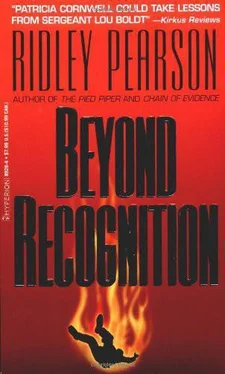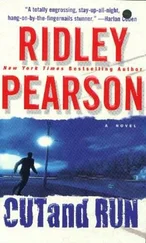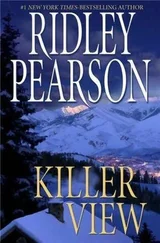Ridley Pearson - Beyond Recognition
Здесь есть возможность читать онлайн «Ridley Pearson - Beyond Recognition» весь текст электронной книги совершенно бесплатно (целиком полную версию без сокращений). В некоторых случаях можно слушать аудио, скачать через торрент в формате fb2 и присутствует краткое содержание. Жанр: Триллер, на английском языке. Описание произведения, (предисловие) а так же отзывы посетителей доступны на портале библиотеки ЛибКат.
- Название:Beyond Recognition
- Автор:
- Жанр:
- Год:неизвестен
- ISBN:нет данных
- Рейтинг книги:5 / 5. Голосов: 1
-
Избранное:Добавить в избранное
- Отзывы:
-
Ваша оценка:
- 100
- 1
- 2
- 3
- 4
- 5
Beyond Recognition: краткое содержание, описание и аннотация
Предлагаем к чтению аннотацию, описание, краткое содержание или предисловие (зависит от того, что написал сам автор книги «Beyond Recognition»). Если вы не нашли необходимую информацию о книге — напишите в комментариях, мы постараемся отыскать её.
Beyond Recognition — читать онлайн бесплатно полную книгу (весь текст) целиком
Ниже представлен текст книги, разбитый по страницам. Система сохранения места последней прочитанной страницы, позволяет с удобством читать онлайн бесплатно книгу «Beyond Recognition», без необходимости каждый раз заново искать на чём Вы остановились. Поставьте закладку, и сможете в любой момент перейти на страницу, на которой закончили чтение.
Интервал:
Закладка:
“Things with Liz are okay.”
“You or her?” Bear asked.
“Her,” Boldt answered.
“Serious?”
“Don’t know.”
Bear said, “It’s work. Your work, not hers. Right? That’s why Lynette; that’s why the long face and the heavy heart. This is the way you get when it starts to eat at you. I know you, Monk. You need to lighten up. You should come by and play a couple of sets. You should have never stopped drinking.”
Boldt laughed, amused that Bear always simplified unhappiness to a lack of appropriate drugs. “My stomach stopped me drinking, not me.” He had never been a serious drinker anyway, and Bear knew this, but the two carried on a constant dialogue centered on Boldt’s taking up a few beers every now and again. Bear couldn’t stand the thought of anyone approaching life entirely sober. It frightened him, like a kid afraid of the dark.
“I’m hunting a guy who’s burning women to death,” Boldt said, using a verb he seldom voiced aloud. It cast him in the light of a predator instead of a protector. He preferred the latter. But the truth was that in an open-ended homicide case the detective often became a hunter, like a rancher trying to identify and trap whatever animal was decimating the herd. Bear looked shocked. He furrowed his brow and squinted across the table. Boldt answered the expression. “What went wrong, Bear? Where did we cross that line, and what drove us there? You know? It’s not the same as it once was. People will tell you it is, but it isn’t.”
“I agree,” Bear said in a soft voice; the comedian had left the room. “The rest of us read the headlines, Monk. You guys live with this shit.”
“I think it’s God,” Boldt said immediately, because he’d been thinking about this for a long time and Bear was the kind of friend he could say this to. “Or, more to the point, a lack thereof. I was raised with church. Sunday school, that sort of thing. You?”
Bear nodded. “Temple.”
Boldt continued. “Yeah, and in all those stories, all those lessons, you had good and evil, God and the Devil-no matter what significance you put in either-but they were there, and you had faith, some sense of faith, some belief in something larger than yourself, no matter how small or on what level. Maybe you look at the night sky a little differently or maybe you go to church twice a week, but it’s there, it’s in you. And without it, without that sense of God, there’s no flip side, there’s nothing to fear, and as much as I hate to say it, maybe fear is a good thing in this case. A sense of God-whatever you choose to call it-gives you a soul; without a soul you’re left with unfocused eyes and a sense that you’re at the top of the food chain and anything goes. And that’s what you see in a killer’s eyes: no humanity, no consciousness, no thought or concern for their fellowman. Some kid blows away his best friend over a pair of sneakers-so what? I’m telling you, it’s no act. They have no soul. I interrogate these guys, I look them right in the eye, and I’m telling you they’re beyond recognition. They aren’t human. I don’t know what they are.”
“I’ve seen it,” the bar owner said, nodding in agreement and pulling the skin on his cheeks so that his eye sockets stretched open and he looked slightly monstrous. “I think it’s television. The movies. It desensitizes us. All that killing, the blood, even the sex-and I gotta admit, I like seeing the sex; it’s about as close as I’ve gotten lately! But that’s what I’m saying about the fuck jokes, you know? We’ve bottomed out. The only thing that draws a laugh is bathroom humor about your mother and father’s sex life. You should hear some of the stuff.”
“I’m hunting this guy and part of me doesn’t want to catch him; I don’t want to know. Daffy, she’s all eager to interview this guy, see what makes him tick-take his clock apart. But what if you open up that clock and there’s nothing inside? Come to find out it’s only a face and hands disguising an empty shell? What then? What if there’s nothing to learn? Nothing to change? Nothing to gain? Nothing to do?”
“You need to lose this one, Monk. Pass it off to someone else. Spend more time with Miles. Come back and play happy hour for me.”
“He sends pieces of melted green plastic and notes that look like the work of an eight-year-old.”
“What’s with the melted plastic?” Berenson asked.
“No one knows.”
The melted plastic remained important to Boldt. He had given it to Lofgrin for analysis but had yet to hear back.
“Green plastic,” Berenson said thoughtfully.“You got a weird job, you know that?”
Boldt nodded.
“How big?”
Boldt indicated the size: smaller than a quarter, bigger than a nickel. Berenson loved puzzles.
Berenson speculated. “Not poker chips … whistles-they must make green whistles-jewelry?” he asked. “Some kind of jewelry? A trinket, a key chain, something like that?”
“Jewelry, maybe.” Boldt liked this idea.
They didn’t talk for a while. One of the barflies signaled Bear, and the bar owner served him another drink. Boldt went over to the stage, climbed up and opened the piano, and played a long, rambling mood piece in E minor. It released him.
In the corner, he saw a stack of six backgammon boards and a matching number of Monopoly games. And there was Bear, in a chair, arm resting on the stack of board games, eyes closed, listening.
Bear said, “You could have done it for real, you know? The music. You’re that good, Monk.”
“I’m not that good-you’re just that stoned-and I can’t feed a family on what you pay.” It was a sensitive issue; perhaps Bear had forgotten; perhaps not, Boldt thought. Boldt had taken a two-year leave of absence following the Cross Killer investigation; only Daphne had possessed the persuasive techniques to lure him back to the department. For those two years he had been a good father and a better husband. He had been a happy hour jazz pianist, and Liz had brought home the paycheck. Those times seemed like a decade ago, instead of the five years it had been.
Bear was a little too stoned. He leaned his weight on the stack of board games, and the pile went over and onto the floor, spilling with a racket. “Hey,” Bear said, his lap piled with play money, “I’m rich.” He held up the money. “I’ll give you a raise.”
Boldt knocked off the trumpet fanfare that starts a horse race.
“Then again,” Bear said, down on his hands and knees to clean up the mess, “maybe you won, not me.” He threw something toward the piano player, and Boldt caught sight of it out of the corner of his eye in time to lean back, swipe the air with his large right hand, and snag whatever it was.
He glanced down into his open palm and saw there a small green plastic cube in the shape of a building, complete with a peaked roof, used to mark the purchase of a house on the Monopoly board: green … plastic….
Boldt said, somewhat breathlessly, understanding the significance of the find, “A house!”
“A game,” said Berenson.
Boldt pocketed the small green house, gave his friend an appreciative hug on the way out, and headed directly to the police lab, where he met up with Bernie Lofgrin, who, anxious to leave for the day, nonetheless understood the possible importance of the rush job that Boldt requested.
With the sergeant looking on, Lofgrin ran a comparison analysis of the melted green plastic sent by mail and that of the game piece delivered by the sergeant. He did so on the lab’s Fourier Transform Infrared Spectrophotometer, a device Boldt could name only with a struggle and which Lofgrin referred to by its initials, FTIR. The results offered the first real sense of progress: The two green pieces of plastic were identical in chemical composition; he had a match. The torch was sending melted Monopoly houses as part of his threats. Boldt tried to reach Daphne, hoping to connect some kind of psychological significance to the find-he had a lead and he wanted to run with it; he felt an urgency, a need to follow this to completion-but she didn’t answer, either at her houseboat or at the Adler mansion.
Читать дальшеИнтервал:
Закладка:
Похожие книги на «Beyond Recognition»
Представляем Вашему вниманию похожие книги на «Beyond Recognition» списком для выбора. Мы отобрали схожую по названию и смыслу литературу в надежде предоставить читателям больше вариантов отыскать новые, интересные, ещё непрочитанные произведения.
Обсуждение, отзывы о книге «Beyond Recognition» и просто собственные мнения читателей. Оставьте ваши комментарии, напишите, что Вы думаете о произведении, его смысле или главных героях. Укажите что конкретно понравилось, а что нет, и почему Вы так считаете.












